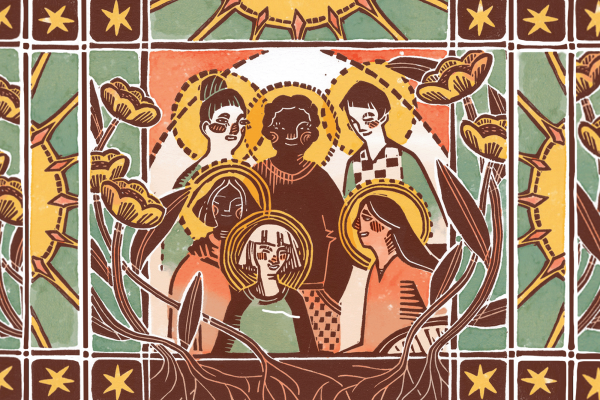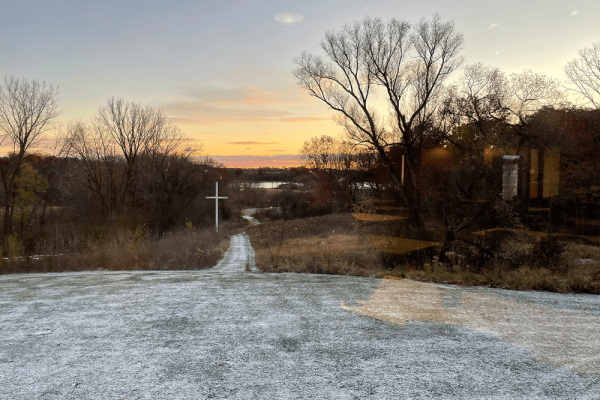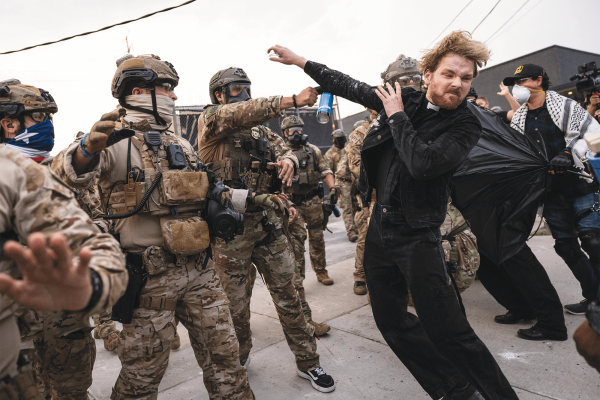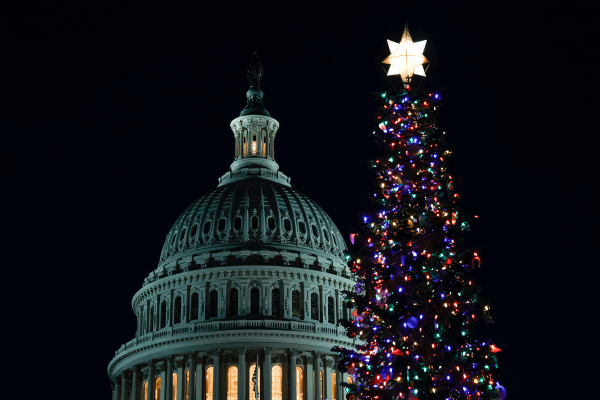THE PAST DECADE has been replete with calls for the church to examine the barriers it often places between spiritual community and racial minorities, women, and LGBTQ people. While that work is ongoing, Christians with disabilities are issuing and answering a call of their own: to embrace a vision of healing and wholeness that includes people of all abilities.
As Rebecca Holland set out to find a career as a young adult, she felt that her gender, her Filipino ethnicity, and her visual impairment were seen as barriers to her calling. After facing discrimination and being told her disability would prevent her from being a teacher, she went on to gain certification in teaching English for middle and high school, an accomplishment of which she is proud. But then she felt the call to ministry, and the journey began again. In seminary, still smarting from the discrimination in her first vocation, she said she did her best to hide her disability. On top of discouraging attitudes about her call, Holland said she faced an added layer of alienation when Christians would tell her that if she had faith, her physical eyesight could be restored.
Holland’s story of facing discrimination, discouragement, and harmful expectations of healing echo the stories of many disabled Christians and their advocates. And they are urging the church to examine its assumptions about disability, healing, and inclusive practices.
In her first church internship, Holland let people think she was absent-minded when she missed visual cues and clumsy when she knocked things over (because she was walking without her cane). She made up excuses for not driving and went without the accommodations she often needs, like large-print text or screen readers. When it was discovered that she was hiding her disability, she said her mentor was profoundly disappointed in her. Her ministry would be hindered, the mentor said, not because she had a physical disability but because she was living a lie.
Holland committed to be honest when she received her placement as a minister. To her relief, the small congregation joyfully and generously welcomed her as her whole self.
“Being open from the beginning has served me well,” she said, while acknowledging that “other people have had different experiences.”
She said it’s tempting to overperform to make up for the inconvenience of not driving or the days off she needs for occasional eye surgeries. But as she was honest about her needs, the congregation blossomed into new expressions of generosity. When the screen reader she was using stopped working for her, the congregation replaced it without hesitation. She’d assumed they would take it out of her paycheck, but they didn’t. They worked around her walkable radius and helped out when she needed transportation.
“I don’t bleed on my congregation; I think there’s a line,” Holland said. “But I’m open. I’m a real person; I have struggles.”
This summer Holland transferred to a new posting in Hawley, Pa., but she knows that at least some of the changes at her previous church, Christ Community United Methodist in Altoona, Pa., are lasting. With her guiding presence, the congregation realized that physical accommodation is something everyone will need eventually, and they made accessibility a priority. When a congregant left a large bequest to the church, Holland said, they decided to invest it in making the church building more accessible — which included installing an elevator.
‘Just part of the fabric of our community’
FOR ST. ANDREWS United Methodist Church in San Antonio, creating space for people with different ranges of ability did more than expand a church’s ministry. It completely revitalized it.
In 2016, St. Andrews had dwindled to the point that the congregation had to seriously consider closing their doors. Their languishing was something of a mystery. The church is located on the edge of one of the most affluent areas of the city, surrounded by modest single-family homes where young families flock to take advantage of a good school district. The location alone should have kept a steady stream of new families flowing in.
The congregation opted for one last “curveball” before calling it quits, said Michael Crocker, the pastor sent by the denomination to minister to the less-than-50 people still attending. Seven years later, around 600 people attend one of the three services at St. Andrews each Sunday, and despite the pandemic, Crocker said, membership has steadily risen to around 700. In addition to its rapid growth, and perhaps bolstering it, the church has gained a reputation in the disability community in San Antonio. It’s a place where children and adults with disabilities are not only welcomed but accommodated, celebrated, and integrated into the life of the church.
At the 11 a.m. service, a band and modern lighting design make the traditional chapel feel like an evangelical praise and worship service. Families file in for singing and announcements before Crocker begins his sermon and children are dismissed to age-specific groups. Disabled children are welcome to stay with their parents in the service, attend Sunday school groups with their age group, or attend a special class for young people of any age who need one-on-one assistance. That group, “Special People whose Identity is Eternally Significant” (SPiES), usually draws a small group of five people ages 13-19, though sometimes older, said Hannah Beever, the staff member in charge of St. Andrews’ disability ministry.
Beever’s son has cerebral palsy, and it started to really affect his peer relationships after elementary school, she said. She could tell he needed something different than what the other middle school students were doing in the youth group. She started SPiES as an attempt to create a quiet, less stimulating place for kids like her son to connect to God and each other. Beever doesn’t choose infantilizing activities for the group — the kids let her know when something reminds them too much of their occupational therapy — and she trusts that the teens, most of whom have limited speech, are taking in far more than they can communicate. They regularly find ways to show her and their parents how much they are internalizing lessons on the armor of God, the death and resurrection of Jesus, and other themes.
On a recent Sunday, they were making a collage about the Holy Spirit and talking about the analogy of the Holy Spirit as wind. “This is different from teaching, it’s connecting,” Beever said.
The room is always staffed with a one-to-one volunteer ratio, she said. On the day of my visit, every SPiES kid had a same-age peer who volunteered to make a collage with them. Teenagers are her most enthusiastic volunteers, Beever said, and many of them have family members with special needs. When one of the SPiES teens grew frustrated and decided to lie down on the rug, the teen who had been working alongside her lay down next to her, and soon the two were talking quietly, playing with a soothing toy.
During the week, the church is also host to SA Life Academy, a day program for adults with intellectual disabilities. Every day, St. Andrews is open, serving people with disabilities, Crocker said. “It’s just part of the fabric of our community.”
On Sundays, vocalizations, stimming (repetitive motions), or dancing don’t sound like interruptions, Crocker said; they’re just part of the soundscape of the service. “We hold things loosely that other churches hold tight,” he said.
He does this in part because he and his wife, Ginna, were determined that their daughter Grace would be part of their ministry — participating in worship, church events, and discipleship. Grace can often be found in the back of the sanctuary where there’s enough open space for her and others to dance and for kids in wheelchairs to congregate and move freely with or without assistance.
“Having a daughter with special needs has shaped my ministry completely,” he said.
Rethinking ‘healing’ ministry
FAMILES ARE FLOCKING to St. Andrews in part, one visiting parent told Sojourners, because there are so few churches where a wheelchair, stimming, or a joyful vocalization is welcome. Most often they are treated like a disruption or an inconvenience — like a flaw in the church’s vision of itself as a place of healing and wholeness.
When it comes to embracing disabled and nondisabled people as a denomination, Holland said, “The United Methodist Church is making very big strides.” Holland has taken on various leadership roles in the UMC Susquehanna conference, and in the broader denomination, specifically related to disability ministries and ministers who are themselves disabled. She also writes about these topics. She sees progress, but she still hears stories of discrimination and exclusion too. But churches still struggle, often seeing disabled people as people who need healing.
“If I had a drum to beat,” Holland said, “it would be a warning drum: Be careful with ‘healing.’”
Scottish disability theologian and Presbyterian minister John Swinton said there is nowhere that Christians’ limited view of the body of Christ shows up more clearly than in healing ministries. When churches ask what they can do to be more inclusive of people with disabilities, he always starts with, “Rethink your healing ministry.”
Healing ministries often focus on a physical cure — an end to a person’s disability. But if you look at Jesus’ ministry, Swinton said, “the curing is never the point.” Instead, Jesus healed in the context of enabling the person to live at peace with God and their neighbors — shalom. Sometimes that reconnection to society might have required physical healing, and sometimes the healing was a compassionate alleviation of suffering — both are illustrated in the case of the woman with an issue of blood and the people with leprosy — but it always came in the context of an affirmation of the person’s unconditional dignity, their spiritual and ethical agency. The church is still learning that physical and mental ability are not requisite for inclusion in the celebrated family of God.
Wholeness, as Swinton describes it, isn’t a question of being able to run a certain speed or comprehend a certain systematic theology book. To be connected to God as a disciple will look different for everyone, rather than separating out those who our society categorizes as disabled, making them an outreach group. Swinton recommends asking, “What does it mean to be a disciple?” The church, Swinton said, must be willing to equip and embrace all disciples, not just able-bodied people.
For some, their disability will be integral to their life as a disciple, because it is part of their identity. The late disability theologian Nancy L. Eiesland wrote that she did not want to be “cured” of her disabilities in heaven because she would no longer be herself without them. She wrote that the disabling wounds on the risen Christ are evidence that “full personhood is compatible with the experience of disability.”
At the same time, Holland said, some people do want to be cured. They do want to walk without pain or see the faces of their loved ones. People with visible disabilities face spiritual pains, infections and viruses, and broken relationships just like people who are currently without disabilities. When a person comes for healing, Holland said, we should never assume we know what it is they want to have healed.
The important thing is that every person is given the agency to decide what needs to be cured and how to seek that cure, Holland said. Too often “charlatan” healers offer false, miracle-cure hope, she said, and create more alienation and pain for people who could be experiencing a healing connection to God and the church. When they are made to feel like their faith is insufficient, she said, it creates a new wound, a new alienation from God and community.
“In this life we may experience many minor cures,” Holland said. “As a church, we want to put the emphasis on the healing of the soul and restoration to community and God.”

Got something to say about what you're reading? We value your feedback!







